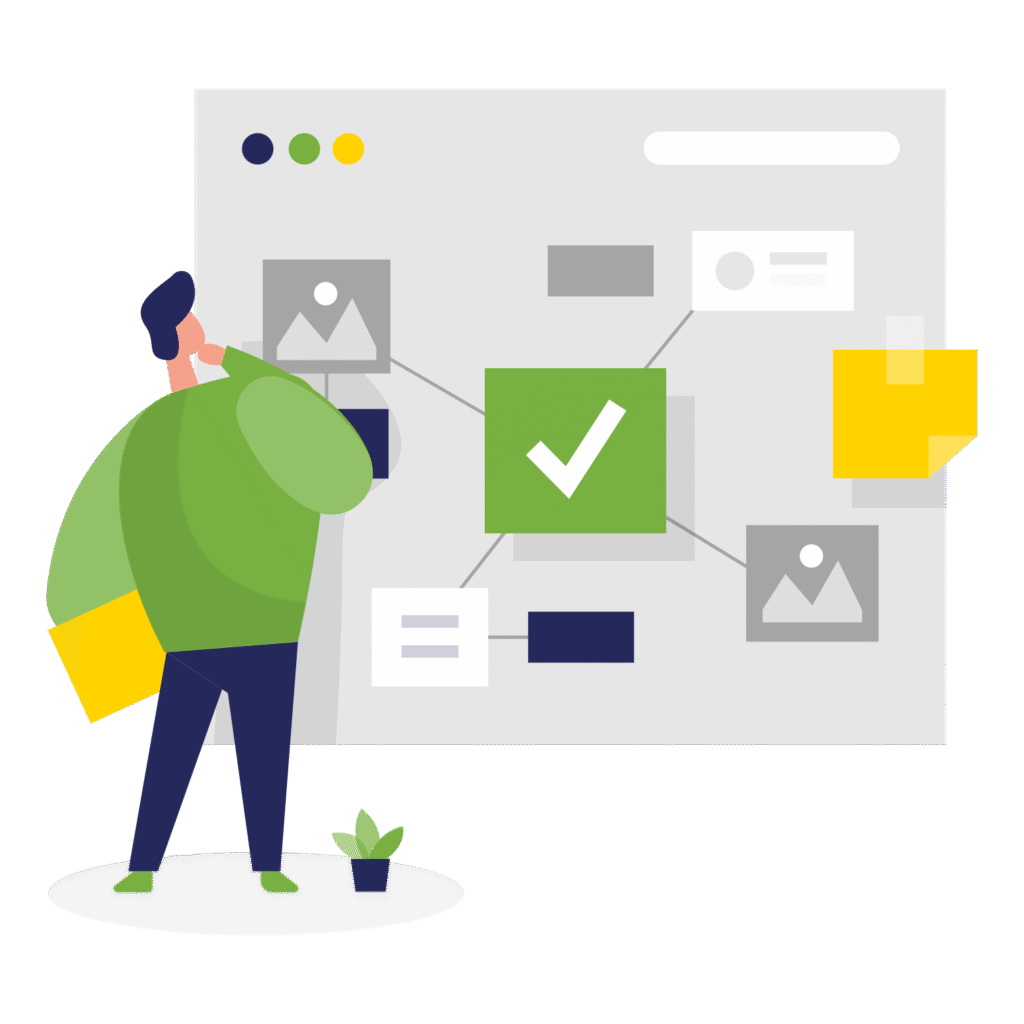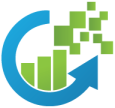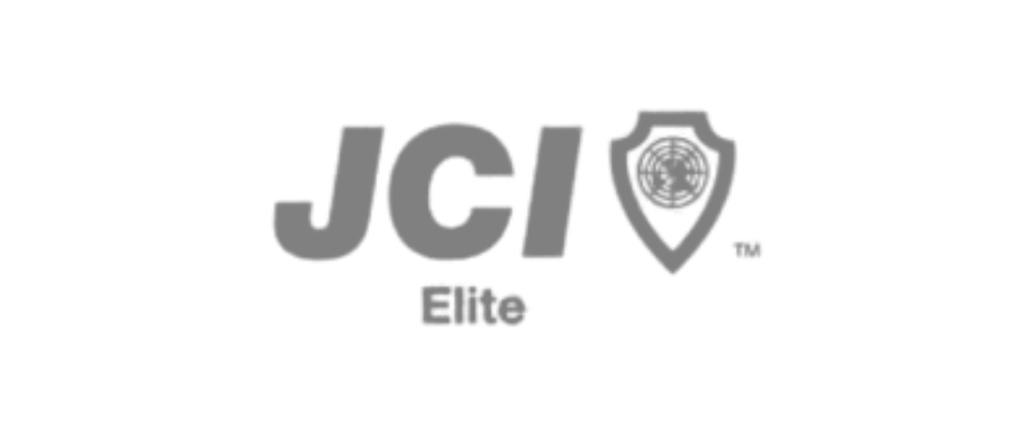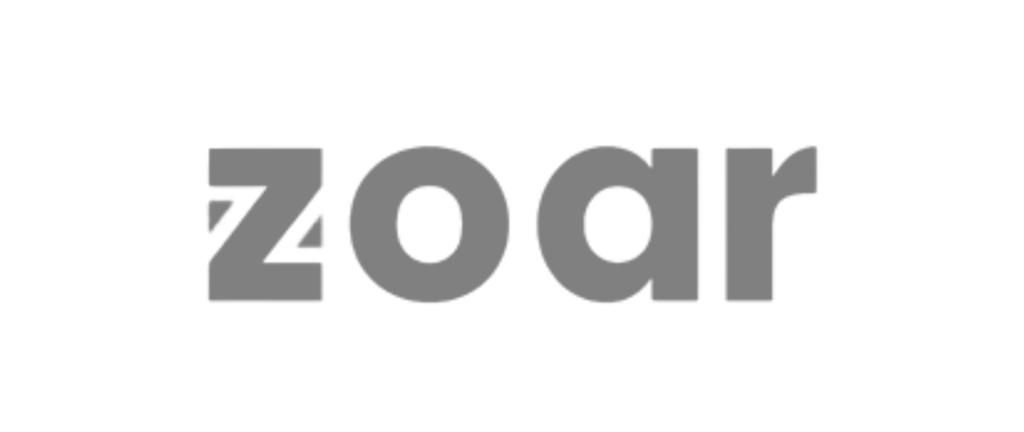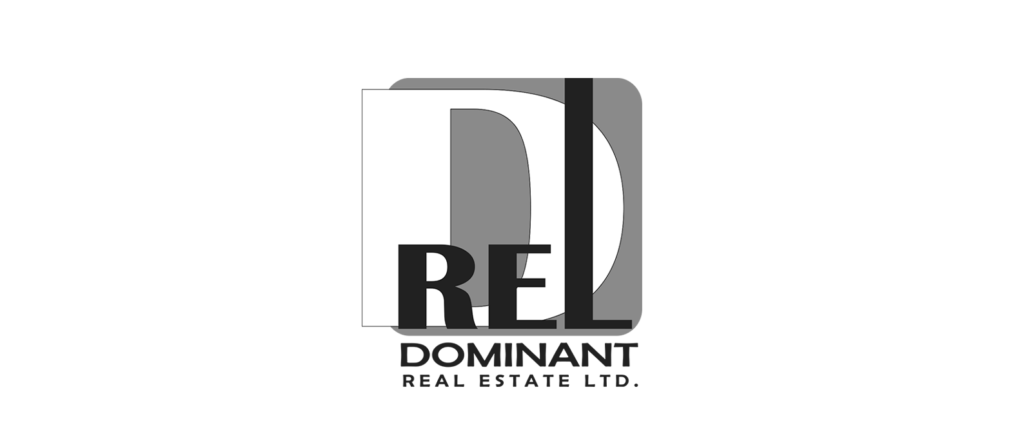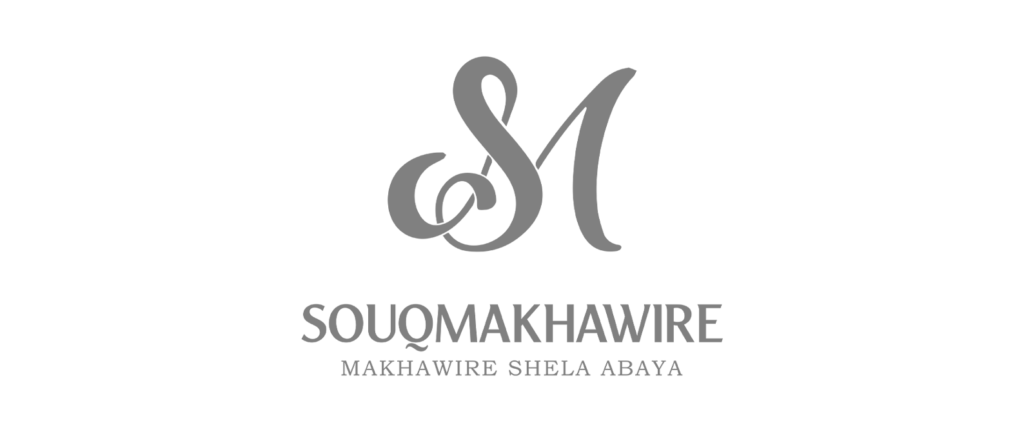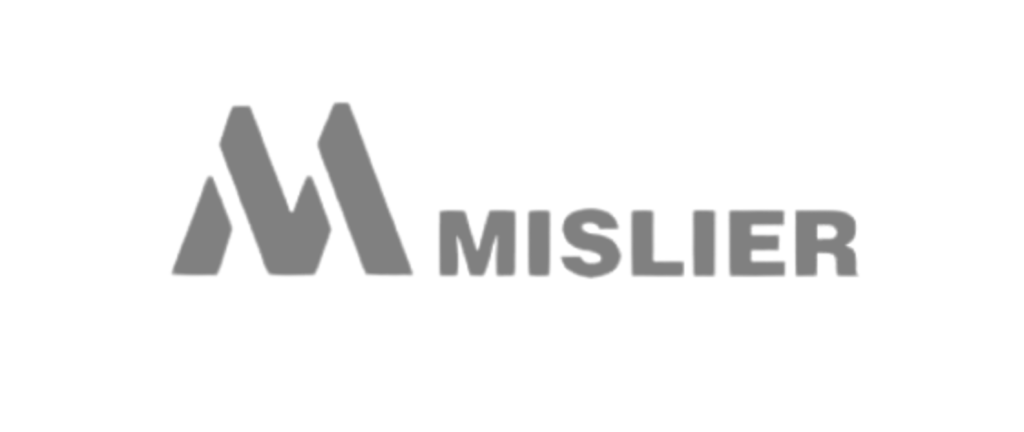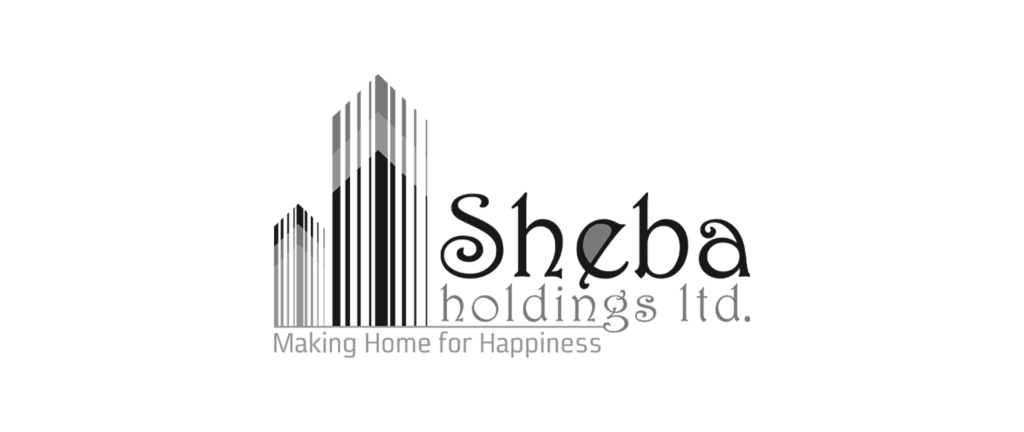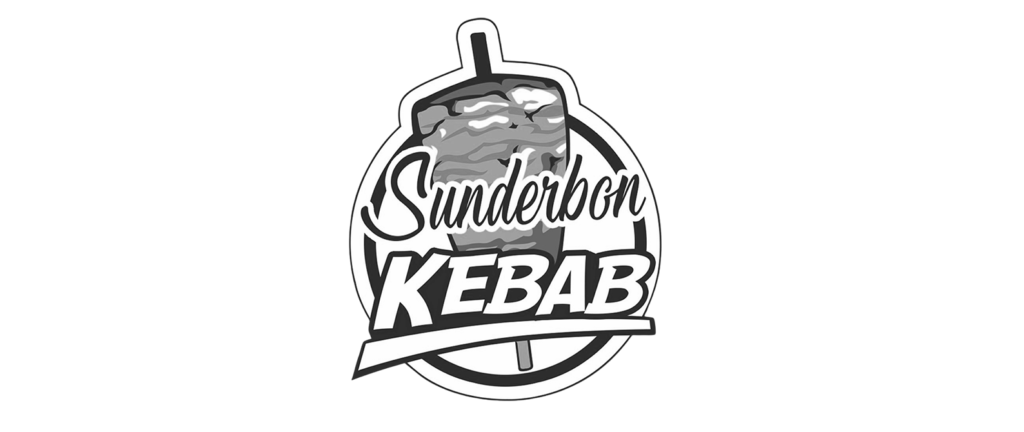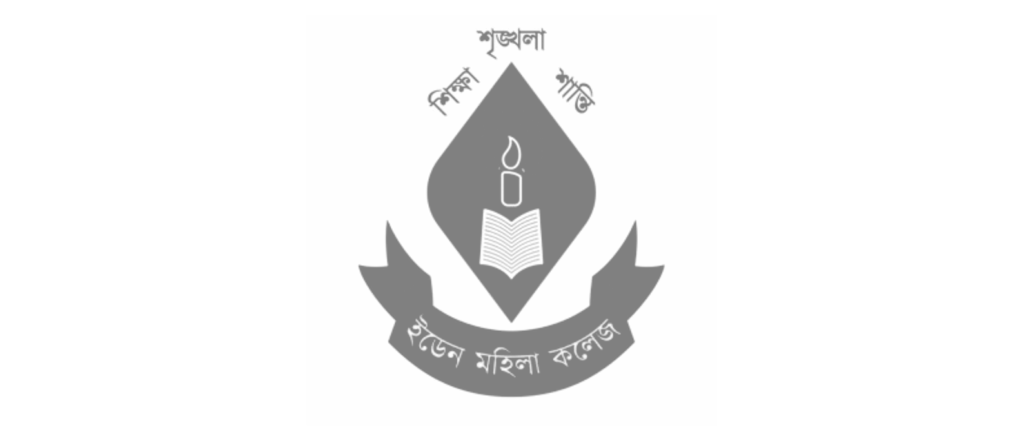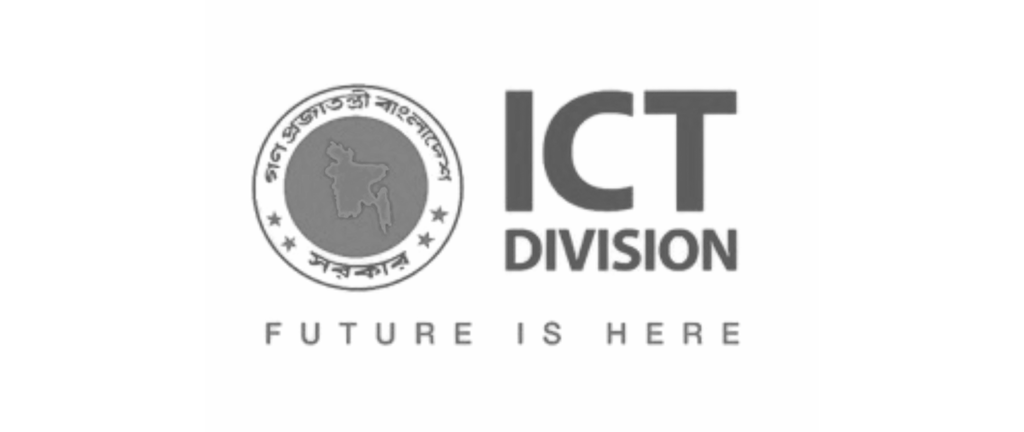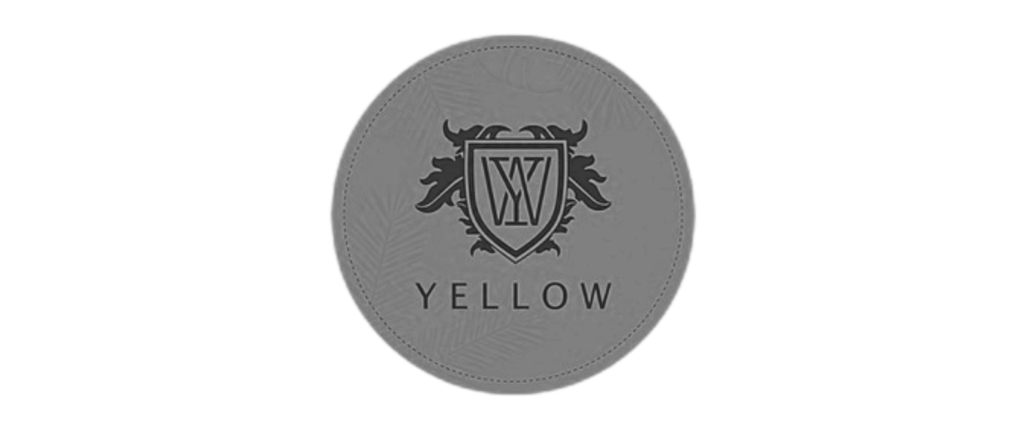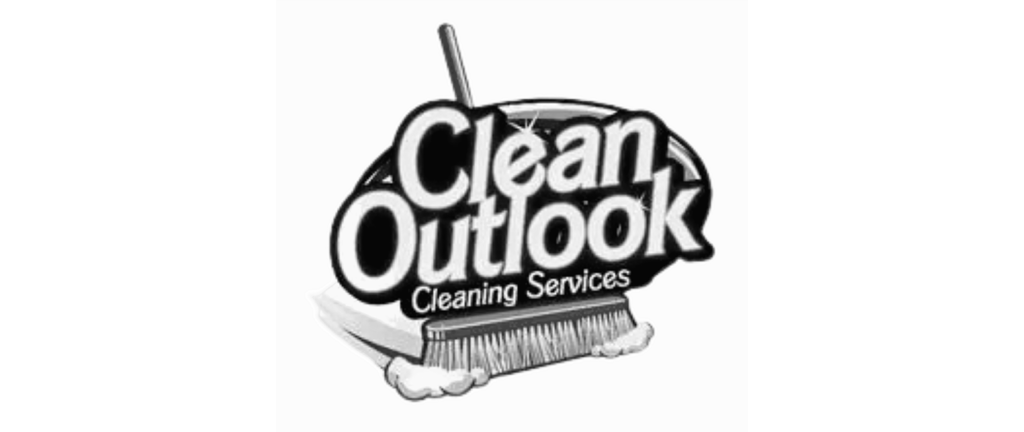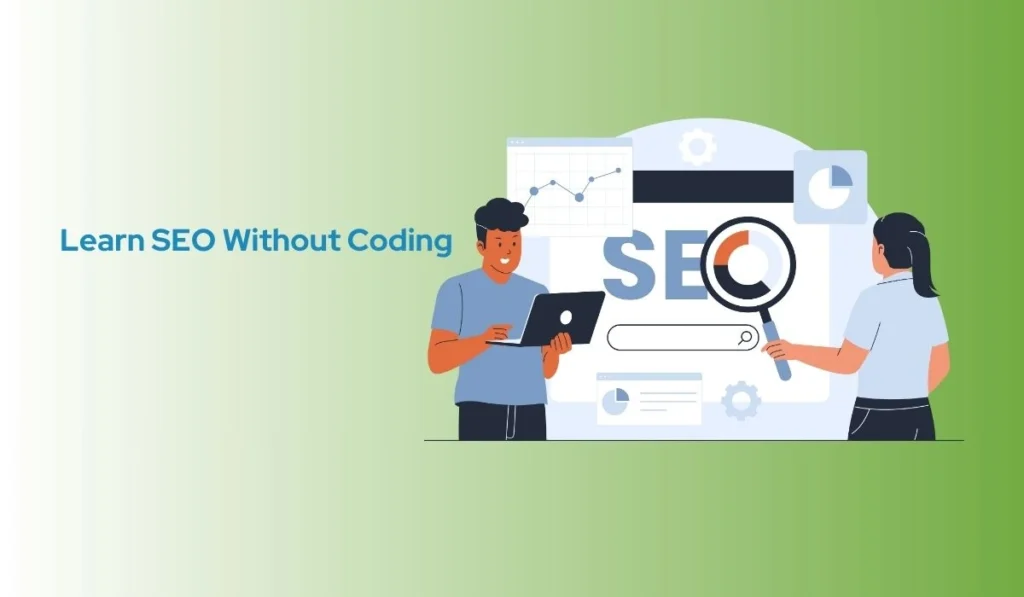
Many beginners feel scared when they hear “technical SEO”. They think it means writing code every day. But is that true?
Can you really learn SEO and rank websites without touching any code? This question worries thousands of new marketers, bloggers, and small business owners in Bangladesh and around the world.
Don’t worry! And stay with Digital Wit. We will show you simple steps, free tools, and real proof that anyone can do SEO successfully Without Coding.
The good news? Yes, you can! Most successful SEO experts today never write code. You can start growing your traffic right now no programming needed!
Why People Think SEO Requires Coding
The words technical SEO often make beginners feel afraid. They think it means you have to write code every day. You see job posts asking for HTML, CSS, JavaScript, Python, or PHP knowledge and you feel lost.
Some people read about JavaScript rendering or schema markup and believe only coders can do SEO.This creates a big fear. Many think, “If I don’t know coding, I can never understand SEO properly.” They worry they cannot fix crawl errors or make Google read their site correctly.
These thoughts are very common among new learners. But the truth is different. Most daily SEO work does not need you to write even one line of code. You can learn and do SEO very well without coding at all.
Does SEO Actually Require Coding? (Expert Insights)
Most SEO experts say no, you do not need to write code every day. Many surveys prove this.
For prediction, one survey asked hundreds of SEO professionals. About one-third said they never write code in their daily work. Another 2025 report showed similar results. Even on Reddit and LinkedIn, most SEOs agree coding is not a must.
You must know the difference between “need to code” and “good to understand code”.
- Need to code = writing new lines of code yourself. Very few jobs want this.
- Good to understand = reading simple HTML or knowing what a developer does. This helps a lot but you don’t write it.
SEO unicorns who are experts in both strategy and heavy coding are very rare. Most successful SEOs are generalists or strategy-focused people. They rank sites without touching code. You can too.
Different Types of SEO Roles
SEO work has two main parts. One is strategy, and another is technical. Most people think only technical SEO needs coding, but that is not true.
An SEO strategist plans everything. He finds good keywords, makes content plans, builds links, and checks reports. He does not write code at all.
A technical SEO specialist fixes website problems. He works on site speed, crawl errors, schema, and JavaScript issues. Sometimes he uses coding, but many times plugins do the job.
Most jobs today want strategists or generalists. You can start as a strategist and earn good money. Many bloggers and freelancers rank high without touching code.
Non-technical skills matter more. Good writing, research, understanding people, and patience bring long-term success. If you love planning and creating content, you can become a successful SEO professional without learning programming.
Understanding SEO Fundamentals Without Code
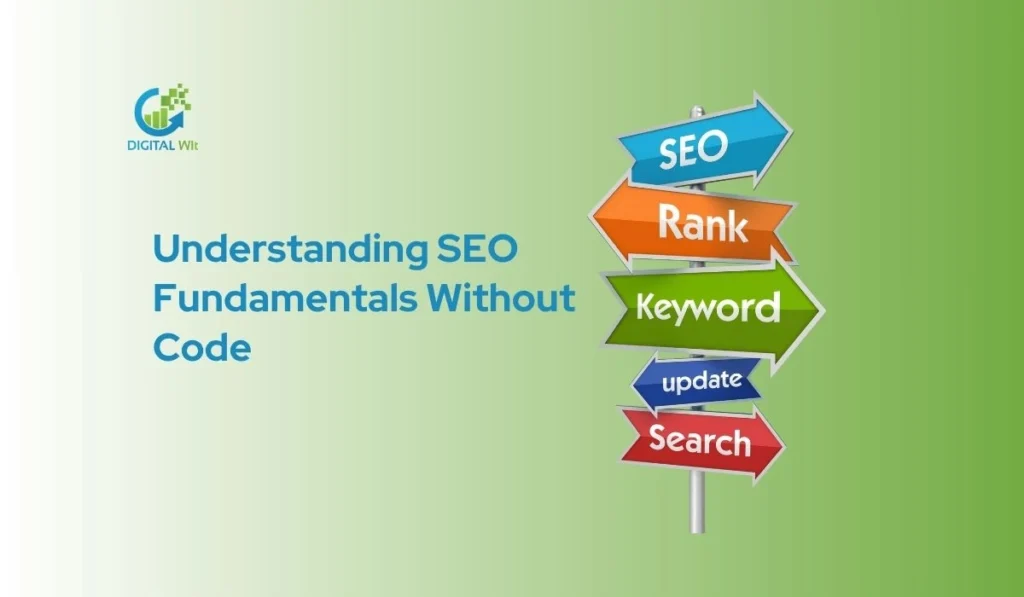
What is SEO in Simple Terms?
SEO means helping Google find your website easily.
When people search for something, Google shows the best pages first.
You make your pages useful and clear so Google likes them.
Most of this work needs no coding at all.
Why Every Beginner or Entrepreneur Should Learn SEO
SEO brings free visitors to your site every day.
You don’t need to pay for ads all the time.
Small business owners and bloggers grow fast with good SEO.
Learning SEO gives you control and saves money.
Understanding Search Engines
Search engines do three main things.
- Crawling: Google sends a robot to visit and read every page.
- Indexing: Google keeps a copy of pages in its big library.
- Ranking: Google decides which pages to show first when someone searches.
Google also checks E-E-A-T.
- Experience: You know the topic from real life.
- Expertise: You give correct and helpful information.
- Authoritativeness: People trust you and link to your site.
- Trustworthiness: Your site is safe and honest.
You can build all these things just by writing good content and getting real links. No code needed!
The SEO Learning Roadmap for Non-Coders
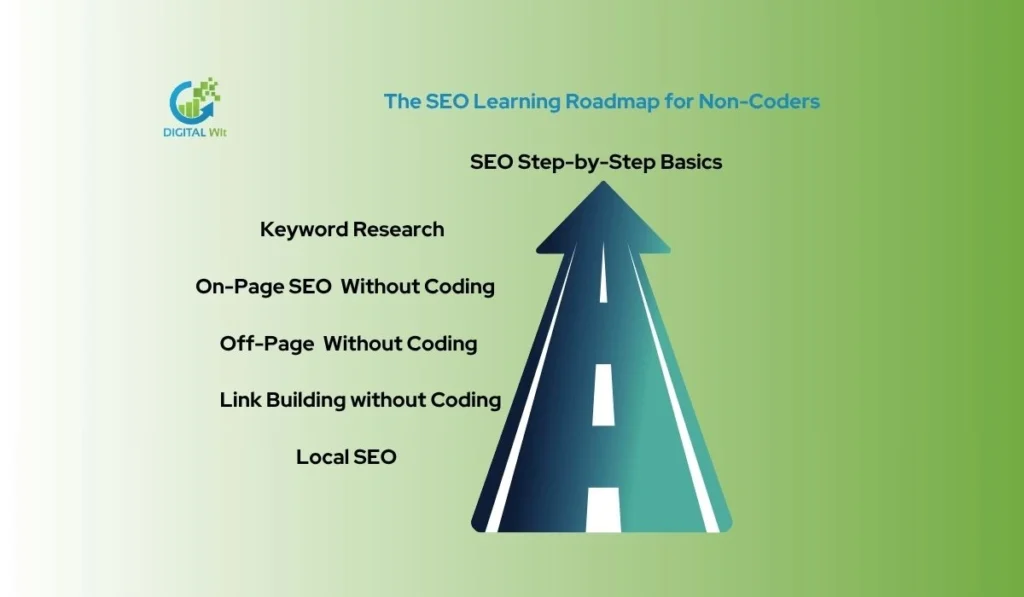
You can learn SEO step by step Basics for Beginners without touching any code. This roadmap is made for beginners who feel scared of technical things. Just follow these simple steps and you will see results soon.
Step-by-Step Basics for Beginners
Start small and grow slowly. First understand what people search on Google. Then make your content match those searches. Do one thing at a time and enjoy the journey.
Keyword Research Made Easy
Keywords are the words people type in Google. Find easy keywords that many people search but few websites target. These are called long-tail keywords.
You must know the search intent. It means understanding what the searcher really wants. Free tools help you find good keywords quickly.
- Google Keyword Planner is free and simple to use.
- Ubersuggest shows search volume and difficulty.
- AnswerThePublic gives real questions people ask.
On-Page SEO Hacks Without Coding
You can do on-page SEO with just your mouse. Write clear title tags and meta descriptions. Use headings properly in your article. Add internal links to connect your pages. Always write alt text for images. Compress images and use WebP format for faster loading.
Content Creation: Write SEO-Friendly Blogs That Rank
Write for humans first, then search engines. Use simple words and short sentences. Update old posts to keep them fresh. You can use free AI tools to get ideas fast. But always check and edit the content yourself.
Implementing SEO in Popular CMS Platforms
WordPress is the easiest for beginners. Wix and Squarespace also work well. Webflow is good if you like drag-and-drop.Best plugins are Yoast, Rank Math, and All in One SEO. They guide you like a teacher.
Building an SEO Process: Strategy, Goals, and Measurement
Set clear goals like getting 100 visitors daily. Make a content plan every month. Check results using Google Search Console and Analytics every week. Keep doing what works and fix what doesn’t.
Off-Page and Link Building (No Coding Needed)
Backlinks are still very important in 2026. Search engines see them as votes of trust. When good sites link to you, Google thinks your site is helpful and gives you better ranking.
You can start link building today without spending money or coding.
- Guest blogging is easy. Find blogs in your topic, send a short email, and offer to write a helpful article. They publish it with your link.
- Broken link building works great. Use free tools to find dead links on other sites. Tell the owner and suggest your page as a replacement.
- Join forums and Facebook groups. Give real answers to questions. People will visit your site and sometimes link to you.
- Share your content on social media. When people talk about your brand, Google notices it. This is called brand mentions and social signals.
Always give value first. Never buy links Google can punish you. Start with one guest post this week. You will see new visitors soon!
Local SEO Tips for Fast Visibility
Local SEO helps your shop or business show up when people search near them. You can do it without any coding.
Why Google Business Profile (GBP) is Essential
Google Business Profile is free and very powerful. You just claim your shop on Google. Add photos, address, phone number and working hours. Now when someone searches “cafe near me” or your shop name, your business appears on Google Maps and searches. Customers trust it more and visit fast.
Adding NAP (Name, Address, Phone) Everywhere
NAP means Name, Address, Phone number. Write them exactly the same everywhere – website, Facebook page, Instagram bio, local directories and footer. Google checks this. The same NAP tells Google your business is real. It helps you rank higher in local results.
Getting Reviews for Credibility
Reviews work like free ads. Happy customers leave 4-5 star reviews. After good service, just ask “Can you give us a quick Google review?” More good reviews push your business to the top. People trust shops with many real reviews. Start asking today – it is easy and brings more customers.
Do You Need a Web Developer for SEO Tasks?
You can do most SEO work alone. Tools and plugins help a lot. But sometimes you face tough problems. Then a web developer can save your time.
You need developer help only in a few cases. For example, when JavaScript blocks Google from reading your page. Or when you want custom redirects for old links. Or when site speed is very slow even after using plugins.
Or when you need special code for international sites. These things are hard without coding knowledge.
Do not worry. You do not need to know code to talk to developers. Just explain the problem in simple words. Tell them what you want to achieve. Show screenshots from Search Console or PageSpeed Insights. Write a short ticket like this:
“Hi, Google cannot read my product prices because of JavaScript. Can you add the prices in normal HTML? Here is the report.”
That is enough. Most developers understand fast.
Many freelancers keep one developer friend. They pay small money only when needed. You can do 80-90% of SEO yourself and take little help for the rest. No tension at all.
What Programming Languages Are Commonly Discussed in SEO?
Many beginners worry about coding. They see HTML, CSS, JavaScript, Python, and PHP and think they must learn it all. Let’s make it simple for you.
Do I Need to Learn HTML for SEO?
HTML is the basic structure of every web page. It holds title tags, headings, and meta descriptions. You do not need to write HTML from zero. But if you can read it a little, you can check your headings and fix simple mistakes fast. Most SEO plugins do the job for you. So, no, you don’t need to learn full HTML.
Do I Need to Know CSS for SEO?
CSS controls how a page looks – colours, fonts, spacing. It can affect page speed a little. You never need to write CSS yourself. Good themes and plugins keep CSS clean. Understanding it helps when you talk to a developer, but you can do SEO perfectly without touching CSS.
Do I Need to Know JavaScript for SEO?
JavaScript makes websites interactive. Sometimes it hides content from Google. You do not need to write JavaScript. You only need to know if it causes problems. Tools like Search Console show you the issues. Then you ask a developer to fix. Simple.
Do You Need Python for SEO?
Many pros use Python for big data and automation. Beginners do not need it at all. Free tools already do the same work with clicks. Learn Python only if you want to become an advanced specialist later.
Do I Need to Know PHP for SEO?
WordPress runs on PHP. You never need to write PHP code. Plugins like Yoast or Rank Math do everything for you. Millions of sites rank high without anyone touching PHP. You can too.
Python, JavaScript, and Automation
Many people worry about Python and JavaScript. They think these are a must for SEO. But honestly, you can do great SEO without touching any code. Yes, sometimes coding gives a small edge.
For example, if a site uses heavy JavaScript, a coder can check rendering fast. Or someone can write a Python script to collect data quickly. That saves time for big agencies.
But for most of us, these are not needed daily.
You can do the same work with simple no-code tools:
- Use Zapier or Make.com to move data automatically
- Rank Math and Yoast have built-in redirects and schema
- ChatGPT can write regex or simple checks for you
- Google Sheets with free add-ons can pull keyword data
Most SEO specialists never write a single line of code and still get top results.
If you want to learn Python later, it is a bonus. But right now, you do not need it. Just start with easy tools and grow your traffic. You will be fine.
SEO Reporting & Analytics
You can track your SEO progress without spending money or writing code. These free tools help you see what works and what needs fix.
Google Search Console – Your Free SEO Doctor
This tool is 100% free from Google. You just add your website and verify it. It takes five minutes.
After setup, check these simple reports:
- Performance report: shows clicks, impressions and your average position.
- Coverage report: tells if Google can read all pages or finds errors.
- Core Web Vitals: checks if your site is fast on mobile and desktop.
- Mobile Usability: points out mobile problems. You can fix most issues with plugins – no coding needed.
Google Analytics – See Who Visits Your Site
Google Analytics is also free. Add it using a plugin if you use WordPress.
Important numbers for beginners:
Users: how many people come.
Sessions: total visits.
Bounce rate: percentage who leave after one page.
Average time on site: how long people stay. Lower bounce rate and higher time mean your content is good.
Quick Checks with Browser
Open any page, right-click and choose “Inspect”. You can see the title, meta description and headings without coding.
Install free extensions like SEOquake or Detailed SEO. They show all SEO data in one click. Very fast and easy.
With these three tools you can measure and improve SEO every week. No coding, no cost, only action!
The Best Free Resources and Tools to Learn SEO Without Coding
You can learn SEO without coding very easily because many free resources are available now. These tools and guides use simple language and no code at all.
Here are some top free places to start:
Google Search Console Help Google itself teaches you how search works. Very simple and direct.
- Ahrefs Academy – Free video courses with step-by-step lessons. Great for beginners.
- Semrush Academy – Gives free certificates. You learn keyword research and on-page SEO fast.
- HubSpot Academy SEO Course – Short videos and quizzes. Perfect if you hate reading long pages.
- Backlinko Blog by Brian Dean – Easy articles with pictures. Each post teaches one big idea.
- Moz Beginner’s Guide to SEO – Like a free ebook. Read it once and understand everything basic.
- YouTube channels: Ahrefs, Surfside PPC, Income School – They show screens and explain slowly.
Start with Google Skillshop SEO course first. It is 100% free and gives you a certificate. Then watch Ahrefs videos. In 30 days you will feel confident. All these are free forever and need zero coding. Just click and learn!
Becoming an SEO Specialist: Career Path Without Tech Skills
You do not need coding to become a good SEO specialist. Many people in Bangladesh and all over the world are earning well only with simple SEO knowledge. Companies want results, not code. They love people who can bring traffic and sales.
Most SEO jobs today focus on planning and content. You can choose easy roles that need no coding at all.
- SEO content writer – write blogs that rank high
- Link building expert – find good websites for backlinks
- Local SEO specialist – help small shops appear on Google maps
- SEO strategist – make plans for clients
Freelancing is very popular. Many Bangladeshi freelancers work on Upwork and Fiverr. They charge 20-100 dollars (as per prediction) per hour without writing one line of code. Even big agencies hire non-technical SEOs. Developers are in separate teams.
If you enjoy writing, researching keywords, and helping websites grow, you can start your SEO career today. Start small, learn daily, and soon clients will come to you.
Common SEO Mistakes Newbies Make
Many beginners make some simple mistakes when they start SEO.
These mistakes stop their sites from ranking well.
Do not worry, you can fix them easily.
Let us look at the four big ones.
Relying too heavily on default plugin settings
You install Yoast or Rank Math and think everything is okay.
Default settings are good but not perfect for every site.
Your pages may miss important chances.
Always check title tags, meta descriptions and schema settings yourself.
Ignoring page speed, mobile-friendliness, or crawl issues
Slow pages make visitors leave fast.
Google also does not like slow or non-mobile sites.
Your rankings drop and traffic becomes very low.
Use Google PageSpeed Insights and Search Console to find and fix problems.
Focusing only on content and forgetting structured data
Good content is important, but schema helps Google understand it better.
Without schema you miss rich snippets in search results.
Your articles look normal while others look special.
Add schema with free plugins or Google’s structured data tool.
Chasing rankings instead of user intent
You try to rank for big keywords without thinking about what people really want.
Traffic comes but visitors leave quickly because content does not help.
The bounce rate goes high and Google pushes your site down.
Always write content that answers the searcher’s real question.
Avoid these small mistakes and your SEO journey will become much smoother.
Pros and Cons of Learning SEO Without Coding
Pros
You can learn SEO much faster when you skip coding. Most beginners start seeing traffic in just a few weeks. You only focus on simple things like keywords and content. This saves months of time.
You get results quickly. Good content and easy on-page changes bring visitors fast. Many people see sales or leads in the first month itself. No need to wait years like learning programming.
It is very affordable. Free tools like Google Search Console and cheap plugins do most of the work. Anyone with a small budget can start today. You do not need costly coding courses.
Cons
Some advanced technical tasks still need coding knowledge. Big sites with JavaScript issues may need a developer. You cannot fix everything alone.
You depend a lot on plugins. If a plugin stops working or updates badly, your rankings can drop. Finding a new plugin takes time and effort.
Tips & Best Practices for Non-Coders Doing SEO
You can do great SEO even without coding. Here are some simple tips that work very well.
- Use SEO plugins wisely. Yoast and Rank Math are very popular. Change the basic settings yourself. Do not just install and forget. Check title tags and meta descriptions every time you publish.
- Regularly audit with no-code tools. Use Google Search Console and Ubersuggest every month. They quickly show broken links or slow pages. Fix them fast.
- Learn to read basic HTML and CSS. You don’t need to write code. Just right-click and choose “inspect”. It helps you see wrong headings or missing alt text.
- Stay consistent and keep learning. Read one short SEO article or watch one video every day. Small steps bring big results soon.
FAQs: Answering Your Top Questions
- Does SEO require coding?
No, successful SEO primarily relies on strategy and content, not coding. You can use tools and plugins for technical fixes.
- Can I learn SEO on my own?
Yes, many free resources, guides, and courses are available online to teach yourself SEO basics.
- Does SEO contain coding?
Technical SEO deals with website code and structure, but you don’t need to write the code yourself.
- কোডিং ছাড়া কি এসইও শেখা যায়?
হ্যাঁ, কোডিং জ্ঞান ছাড়াই আপনি কার্যকরভাবে এসইও শিখতে এবং প্রয়োগ করতে পারেন।
- Can you master SEO without coding?
You can master most areas like content, link building, and strategy without coding. Knowing code helps in advanced technical audits.
- Is it hard to learn SEO as a total beginner without Coding?
It is not hard. If you focus on the logical and strategic parts, learning SEO is quite manageable.
- Is it important for an SEO to know coding?
It is helpful to understand basic HTML and CSS structure, but it is not essential for most SEO jobs.
- Can you learn SEO without learning web development?
Yes. You can use many accessible tools and Content Management Systems to handle the development side.
- Do you require knowledge in coding when learning SEO?
No, knowledge of coding is not a requirement when starting your SEO learning journey.
- Can I learn SEO online without coding?
Yes. Almost all major online SEO courses teach non-coding strategies and tool usage.
Conclusion
You can absolutely learn and master SEO without coding. Don’t let technical fear stop you. The key is focusing on strategy, quality content, and effective tool usage. Skip the code and concentrate on keywords and user needs. Your next step is to explore Digital Wit for more helpful and simple strategies, or you can also explore how we work as the leading SEO agency in Bangladesh.

